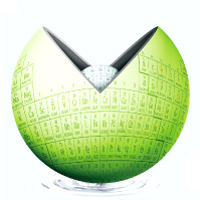
Published for geochemistry community from Geochemical Society of Japan.
The puzzle of the rare gases and of oxygen in materials within the solar system
Geochemical Journal, Vol. 9, No. 2, P. 51-62, 1975
ABSTRACT
An alternative explanation for the oxygen isotope anomaly observed in high-temperature inclusions of carbonaceous chondrites is proposed. Just as the main features of the variation of the isotopic compositions of the rare gases in carbonaceous chondrites can be explained in terms of the alterations due to the processes of a) mass-fractionation and b) cosmic-ray irradiation, the pattern observed by CLAYTON et al. (1973) in their plot of δ17O v. δ18O for high temperature minerals of Allende, Murchison, Murray, etc., is explained as due to a combination of the processes a) and b), which occurred during the early history of the solar system. An ‘early’ irradiation of the solar system materials must have taken place, while the rare gases were beginning to escape from the meteorite parent bodies.- Published : 1975-06-20
- Released on J-STAGE : -
- Received : 1975/04/30
- Accepted : -
- DOI : https://doi.org/10.2343/geochemj.9.51
- J-STAGE URL : https://www.jstage.jst.go.jp/article/geochemj1966/9/2/9_2_51/_article/-char/ja
- J-Online ISSN: 1880-5973
- Print ISSN : 0016-7002
- ISSN-L : 0016-7002
All Issues
- Vol.59, 2025
- Vol.58, 2024
- Vol.57, 2023
- Vol.56, 2022
- Vol.55, 2021
- Vol.54, 2020
- Vol.53, 2019
- Vol.52, 2018
- Vol.51, 2017
- Vol.50, 2016
- Vol.49, 2015
- Vol.48, 2014
- Vol.47, 2013
- Vol.46, 2012
- Vol.45, 2011
- Vol.44, 2010
- Vol.43, 2009
- Vol.42, 2008
- Vol.41, 2007
- Vol.40, 2006
- Vol.39, 2005
- Vol.38, 2004
- Vol.37, 2003
- Vol.36, 2002
- Vol.35, 2001
- Vol.34, 2000
- Vol.33, 1999
- Vol.32, 1998
- Vol.31, 1997
- Vol.30, 1996
- Vol.29, 1995
- Vol.28, 1994
- Vol.27, 1993
- Vol.26, 1992
- Vol.25, 1991
- Vol.24, 1990
- Vol.23, 1989
- Vol.22, 1988
- Vol.21, 1987
- Vol.20, 1986
- Vol.19, 1985-1986
- Vol.18, 1984
- Vol.17, 1983
- Vol.16, 1982
- Vol.15, 1981
- Vol.14, 1980
- Vol.13, 1979
- Vol.12, 1978
- Vol.11, 1977
- Vol.10, 1976
- Vol.9, 1975
- Vol.8, 1974
- Vol.7, 1973
- Vol.6, 1972-1973
- Vol.5, 1971
- Vol.4, 1970-1971
- Vol.3, 1969-1970
- Vol.2, 1968
- Vol.1, 1966-1967
Current Issue:
Stats:
Impact Factor: 1.6 (2024)
Submission to final decision: 9.6 weeks (2022)




